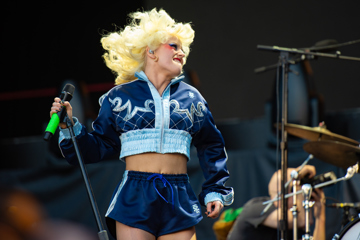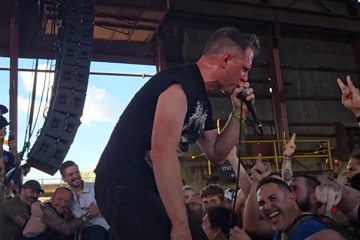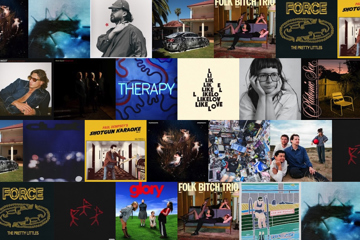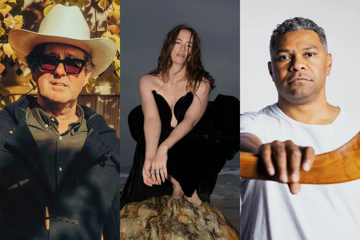Highs And Lowes
"I know that every point in one’s life should be celebrated."
So I was standing at a urinal in a Washington DC men's room when who should walk in but Rob Lowe. This anecdote has little to no bearing on the story that follows, but I figured it was a catchy enough way to begin. If you're after salacious details or anything like that, though, I hate to disappoint – I kept my eyes fixed on the wall in front of me, and our conversation was restricted to matters political. After all, he'd just finished a 20-minute press conference about his performance as John F Kennedy in the upcoming telemovie Killing Kennedy and the politics buff and self-confessed JFK “fanboy” was clearly on something of a roll.
There was a time when Lowe portraying an iconic figure like Kennedy would have seemed out of the question. When he came to prominence in the 1980s, he was a quintessential teen idol type – good-looking to the point of prettiness, undoubtedly charming and a capable enough actor but not necessarily someone you'd call upon to do the heavy lifting. And even though he appeared in a bunch of seminal movies of the decade – the 'Brat Pack' ensemble piece St Elmo's Fire and Francis Ford Coppola's The Outsiders among them – he didn't necessarily make the kind of mark that earned him critical acclaim or rocketted him to superstardom.
There was notoriety, however. In 1988, having a sex tape leaked to the public was a scandal rather than a savvy career move, and Lowe's appearance in a VHS home movie that co-starred a young woman later found to be a minor made him the centre of controversy while putting the brakes on his career. Throughout the '90s he occasionally popped up in a hit (Wayne's World) or gave a performance that hinted at enhanced depth or range (he's seductive and sinister opposite James Spader in the neo-noir Bad Influence) but the majority of his credits from that decade are forgettable B-movies and made-for-TV actioners or melodramas.
But towards the end of the '90s and into the '00s, Lowe – now a family man who'd called it quits on his hard-partying ways – quietly reinvented himself as an actor with the ability to use his absurd handsomeness and easygoing charm to great comedic effect. Playing suave henchman Number Two in the Austin Powers sequels, for example, he displayed a relaxed, understated wittiness. But the biggest step in his transition came with his confident, charismatic work as Deputy White House Communications Director Sam Seaborn on Aaron Sorkin's acclaimed TV drama The West Wing.
Don't miss a beat with our FREE daily newsletter
Lowe's not exactly an A-lister at the moment but he's become something a bit more interesting: a versatile, engaging actor equally at home with comedy or drama. As eternally positive civil servant Chris Traeger, he's emerged as a fan favourite with viewers of the sitcom Parks And Recreation. As a pill-pushing plastic surgeon, he stole every scene in Steven Soderbergh's Liberace biopic Behind The Candelabra. And he brings conviction, strength and humanity to his JFK in Killing Kennedy, airing November 19 on Foxtel's National Geographic Channel.
He's long held an interest in politics (“I've been to the White House a lot,” he admits), and calls Kennedy “one of my personal heroes”, so the opportunity to play the late president, assassinated half a century ago in Dallas, Texas, was one he jumped at.
“There's so much to admire about him but doing the research I was struck by his wit and how quick he was, how curious he was, how well read he was, and how much he valued intellect and the arts – that's rare in all people, but it's really rare in politicians, I think,” says Lowe. “If there's a book about him, I've probably read it, and I wanted to read this script because, as you can imagine, you can treat him and this subject matter in hundreds of different ways and different tones. And I wanted to do it because it was the 50th anniversary of his assassination, and it felt like the right time to do it because so much attention, rightly, is on what America and the world lost when he was killed.”
So why does Kennedy still hold such prominence half a century after his death? It's something Lowe admits to thinking about a great deal. “I think whether it's our politicians or our movie stars or our rock stars, we project our dreams and aspirations onto them,” he says. “And so when he was taken, it felt like we personally lost the best of us, so we grieve it. And we still grieve it. The term 'the best and the brightest' was coined for his administration. Whether it's actually true at this point is irrelevant because collectively, culturally, emotionally we've decided it was true. We lost the best and the brightest, and that's why we still grieve.”
Lowe is clearly taking advantage of the momentum his career has gathered in recent years. He's finished up his role on Parks And Recreation, and is now in the process of putting together the pilot for The Pro, a sitcom which would see him play a former tennis champ working as a coach at an exclusive Beverly Hills sporting club. He's also said to be developing a TV drama titled The Point, loosely based on his childhood experiences relocating to California in the late '70s. He's writing a follow-up to his well received memoir Stories I Only Tell My Friends. And as if to demonstrate that the ghosts of the past have well and truly been put to rest, he has a supporting role opposite Cameron Diaz and Jason Segel in a “big, loud, raunchy, provocative” comedy titled Sex Tape.
“I know that every point in one's life should be celebrated,” says Lowe. “Every part. Not just the good parts, because I've learned more from the bad parts than I ever did from the good parts. That said, in terms of opportunities, this moment has the most, which is really cool considering it's my fourth decade of doing it. I'm glad to still be here four decades later.”







